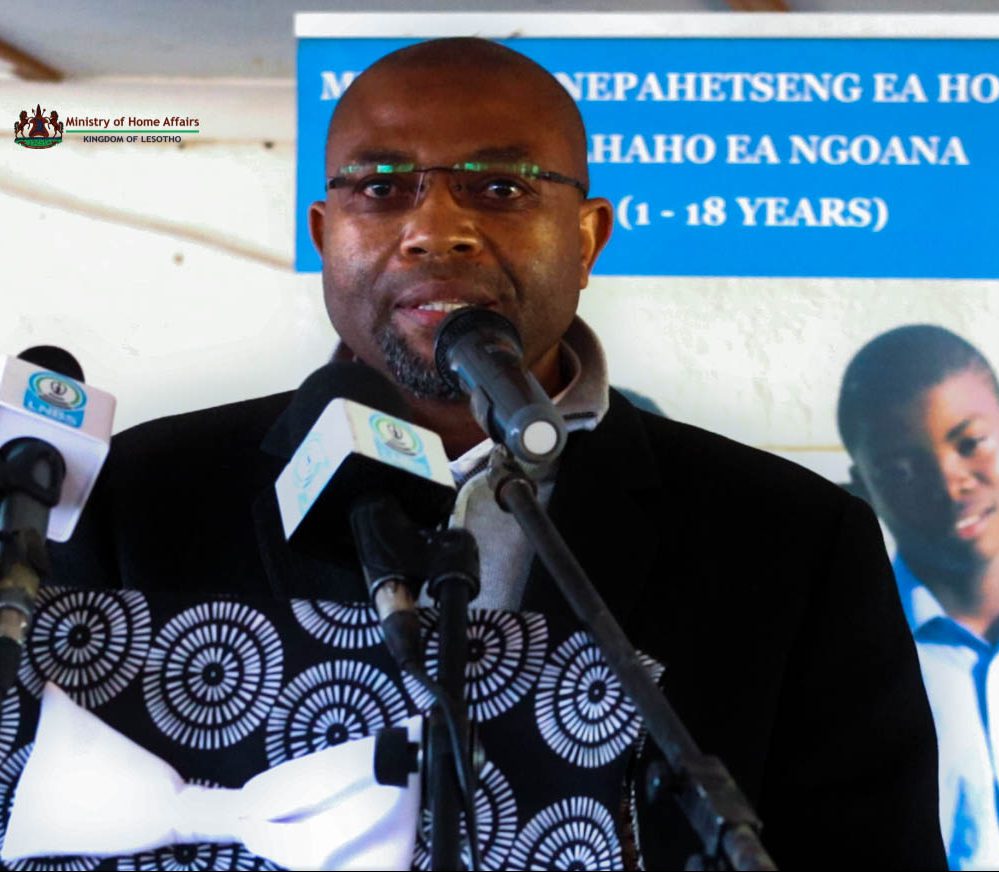
Ministry of Home Affairs on Wednesday 17th August 2022 commemorated Africa Civil Registration and Vital Statistics Day (CRVS), Qanya Community Council, Ha Sekake, in Qacha’s Nek; and this day is celebrated annually on 10th August. This year’s theme is “Harnessing coordination, country leadership and ownership to strengthen integrated civil registration and vital statistics systems: a vehicle for #counting everyone”.
Minister of Home Affairs Honourable Motlalentoa Letsosa said the Ministry has decentralized civil registration services to community authorities – councils, chiefs and hospitals. This is to ensure that birth registration is done at all levels of public sectors, this is in line with Sustainable Development Goal (SDG) 16.9 “provide legal identity for all including free birth registrations” For ease of birth registration process, the Ministry has provided about four hospitals with automated birth registration systems. The same system has been provided to Qanya Community Council. “Qanya community members will no longer have to wait a long time before they acquire their documents,” he said.
He further indicated that from 2020 to 2022, ID registration rate of 60% and birth registration at 70% respectively. Infant registration rate at 80% but could increase only if all expecting women deliver in hospitals. About 2.3 million people are registered from 2013 to 2022, both births and deaths.
Director National Identity and Civil Registry (NICR) Mr. Napo Khuele indicated that it is important for people to have identity documents and children to have birth certificates as they are important for future use. They are one’s form of identity as a legitimate citizen of the country. Civil Registration is the recording of vital events of a person’s life while Vital Statistics is the recording of statistics derived from the occurring events such as births, deaths, marriages, divorces, and adoptions.
Mr Khuele said registration of births and deaths occurring in the country facilitates population recording as per age and sex. He encouraged Basotho to ensure that their children are registered as it eases their recognition as bona fide members of their society and grants them unquestionable identity. It is also one of how the basic human rights of a child can be respected, including protection from child abuse, especially from relatives.
A representative for United Nations International Children’s Emergency Fund (UNICEF) Mr. Deepak Bhaskaran highlighted the importance of a strong and coordinated CRVS system; as being beneficial for the country, informing public policy, and enabling governments to provide accessible social services for the citizens. Mr. Bhaskaran said it has been twelve years since the establishment of the Africa program on accelerated improvement of Civil Registration and Vital Statistics systems.
“The commemoration of Africa Civil Registration and Vital Statistics Day is about renewing our commitment to ensure that all of us present here pledge that every person’s right to legal identity will be ensured,” he said. It is to reaffirm and recognize that legal identity from birth to death is a key human and civil right. This day marks the opportunity for the country to assess the progress it has made toward ensuring the right to a legal identity from the time it started. In the last few years, Lesotho has made progress in the area of CRVS and the Ministry of Home Affairs has developed a costed strategic action plan (2020-2024) and its implementation thereof.
It was at the same event where 25 birth certificates and 93 identity documents were issued to the students from the three schools; Patlong High, Patlong Primary, and John XXIII High.